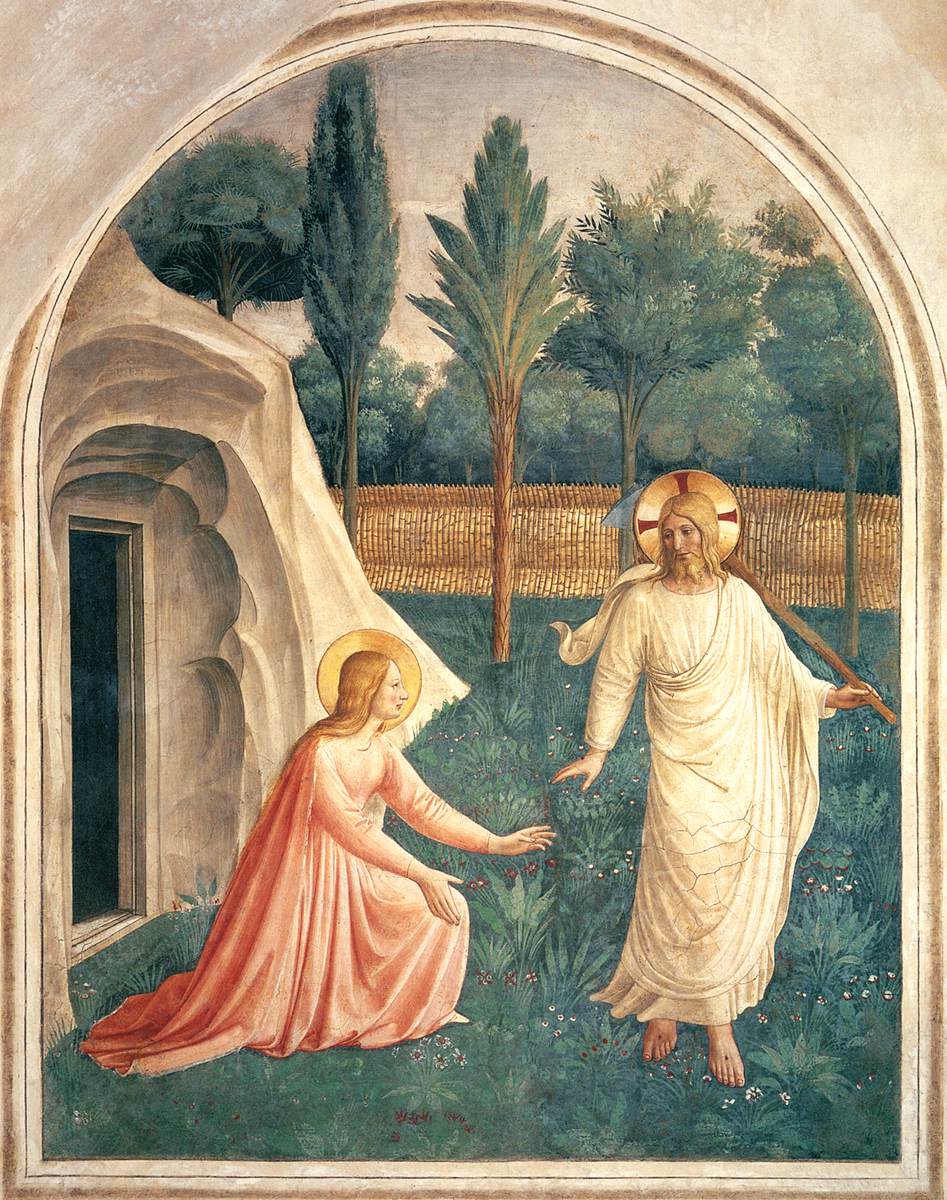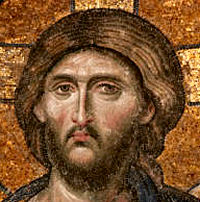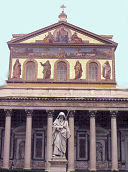11. But Mary stood without at the sepulcher weeping: and as she wept, she stooped down, and looked into the sepulcher,
12. And sees two angels in white sitting, the one at the head, and the other at the feet, where the body of Jesus had lain.
13. And they say to her, Woman, why weep you? She says to them, Because they have taken away my Lord, and I know not where they have laid him.
14. And when she had thus said, she turned herself back, and saw Jesus standing, and knew not that it was Jesus.
15. Jesus says to her, Woman, why weep you? whom seek you? She, supposing him to be the gardener, says to him, Sir, if you have borne him from here, tell me where you have laid him, and I will take him away.
16. Jesus says to her, Mary. She turned herself, and says to him, Rabboni; which is to say Master.
17. Jesus says to her, Touch me not; for I am not yet ascended to my Father: but go to my brethren, and say to them, I ascend to my Father, and your Father; and to my God, and your God.
18. Mary Magdalene came and told the disciples that she had seen the Lord, and that he had spoken these things to her.
GREG. Mary Magdalene, who had been the sinner in the city, and who had washed out the spots of her sins by her tears, whose soul burned with love, did not retire from the sepulcher when the others did: Then the disciples went away again to their own home.
AUG. i.e. To the place where they were lodging, and from which they had ran to the sepulcher. But though the men returned, the stronger love of the woman fixed her to the spot. But Mary stood without at the sepulcher weeping.
AUG. i.e. Outside of the place where the stone sepulcher was, but yet within the garden.
CHRYS. Be not astonished that Mary wept for love at the sepulcher, and Peter did not; for the female sex is naturally tender, and inclined to weep.
AUG. The eyes then which had sought our Lord, and found Him not, now wept without interruption; more for grief that our Lord had been removed, than for His death upon the cross. For now even all memorial of Him was taken away.
AUG. She then saw, with the other women, the Angel sitting on the right, on the stone which had been rolled away from the sepulcher, at whose words it was that she looked into the sepulcher.
CHRYS. The sight of the sepulcher itself was some consolation. Nay, behold her, to console herself still more, stooping down, to see the very place where the body lay: And as she wept, she stooped down, and looked into the sepulcher.
GREG. For to have looked once is not enough for love. Love makes one desire to look over and over again.
AUG. In her too great grief she could believe neither her own eyes, nor the disciples. Or was it a divine impulse which caused her to look in?
GREG. She sought the body, and found it not; she persevered in seeking; and so it came to pass that she found. Her longings growing the stronger, the more they were disappointed, at last found and laid hold on their object. For holy longings ever gain strength by delay, did they not, they would not be longings. Mary so loved, that not content with seeing the sepulcher, she stooped down and looked in: let us see the fruit which came of this persevering love: And sees two Angels in white sitting, the one at the head, and the other at the feet, where the body of Jesus had lain,
CHRYS. As her understanding was not so raised as to be able to gather from the napkins the fact of the resurrection, she is given the sight of Angels in bright apparel, who soothe her sorrow
AUG. But why did one sit at the head, the other at the feet? To signify that the glad tidings of Christ's Gospel was to be delivered from the head to the feet, from the beginning to the end. The Greek word Angel means one who delivers news.
GREG. The Angel sits at the head when the Apostles preach that in the beginning was the Word: he sits, as it were, at the feet, when it is said, The Word was made flesh. By the two Angels too we may understand the two testaments; both of which proclaim alike the incarnation, death, and resurrection of our Lord. The Old seems to sit at the head, the New at the feet.
CHRYS. The Angels who appear say nothing about the resurrection; but by degrees the subject is entered on. First of all they address her compassionately, to prevent her from being overpowered by a spectacle of such extraordinary brightness: And they say to her, Woman, why weep you? The Angels forbade tears, and announced, as it were, the joy that was at hand: Why weep you? As if to say, Weep not.
GREG. The very declarations of Scripture which excite our tears of love, wipe away those very tears, by promising us the sight of our Redeemer again.
AUG. But she, thinking that they wanted to know why she wept, tells them the reason: She says to them, Because they have taken away my Lord. The lifeless body of her Lord, she calls her Lord, putting the part for the whole; just as we confess that Jesus Christ the Son of God was buried, when only His flesh was buried. And I know not where here they hare placed Him: it was a still greater grief, that she did not know where to go to console her grief.
CHRYS. As yet she knew nothing of the resurrection, but thought the body had been taken away.
AUG. Here the Angels must be understood to rise up, for Luke describes them as seen standing.
AUG. The hour was now come, which the Angels announced, when sorrow should be succeeded by joy: And when she had thus said, she turned herself back.
CHRYS. But why, when she is talking to the Angels, and before she has heard any thing from them, does she turn back? It seems to me that while she was speaking, Christ appeared behind her, and that the Angels by their posture, look, and motion, showed that they saw our Lord, and that thus it was that she turned back.
GREG. We must observe that Mary, who as yet doubted our Lord's resurrection, turned back to see Jesus. By her doubting she turned her back, as it were, upon our Lord. Yet inasmuch as she loved, she saw Him. She loved and doubted: she saw, and did not recognize Him: And saw Jesus standing, and knew not that it was Jesus.
CHRYS. To the Angels He appeared as their Lord but not so to c the woman, for the sight coming upon her all at once, would have stupefied her. She was not to be lifted suddenly, but gradually to high things.
GREG. Jesus says to her, Woman, why do you weep? He asks the cause of her grief, to set her longing still more. For the mere mentioning His name whom she sought would inflame her love for Him.
CHRYS. Because He appeared as a common person, she c thought Him the gardener: She, supposing Him to be the gardener, says to Him, Sir, if you have borne Him from here, tell me where you have laid Him, and 1 will take Him away. i.e. If you have taken Him away from fear of the Jews, tell me, and I will take Him again.
THEOPHYL. She was afraid that the Jews might vent their rage even on the lifeless body, and therefore wished to remove it to some secret place.
GREG. Perhaps, however, the woman was right, in believing Jesus to be the gardener. Was not He the spiritual Gardener, who by the power of His love had sown strong seeds of virtue in her breast? But how is it that, as soon as she sees the gardener, as she supposes Him to be, she says without having told Him who it was she was seeking, Sir, if you have borne Him from here? It arises from her love; when one loves a person, one never thinks that any one else can be ignorant of him.
Our Lord, after calling her by the common name of her sex, and not being recognized, calls her by her own name: Jesus says to her, Mary; as if to say, Recognize Him, who recognizes you. Mary, being called by name, recognizes Him; that it was He whom she sought externally, and He who taught her internally to seek. She turned herself, and says to Him, Rabooni; which its to say, Master.
CHRYS. Just as He was sometimes in the midst of the Jews, and they did not know Him till He pleased to make Himself known. But why does she turn herself; when she had turned herself before? It seems to me that when she said, Where you have laid Him, she turned to the Angels, to ask why they were astonished. Then Christ, calling her, discovered Himself by His voice, and made her turn to Him again.
AUG. Or she first turned her body, but thought Him what He was not; now she was turned in heart, and knew who He was. Let no one however blame her, because she called the gardener, Lord, and Jesus, Master. The one was a title of courtesy to a person from whom she was asking a favor; the other of respect to a Teacher from whom she was used to learn to distinguish the divine from the human. The word Lord is used in different senses, when she says, They have taken away my Lord, and when she says, Lord, if you have borne Him away.
GREG The Evangelist does not add what she did upon recognizing Him, but we know from what our Lord said to her: Jesus says to her, Touch Me not. Mary then had tried to embrace His feet, but was not allowed. Why not? The reason follows: For I am not yet ascended to My Father.
AUG. But if standing upon the earth, He is not touched, how shall He be touched sitting in heaven? And did He not before His ascension offer Himself to the touch of the disciples: Handle Me and see, for a spirit has not flesh and bones? Who can be so absurd as to suppose that He was willing that disciples should touch Him before He ascended to His Father, and unwilling that women should till after Nay, we read of women after the resurrection, and before He ascended to His Father, touching Him, one of whom was Mary Magdalene herself, according to Matthew. Either then Mary here is a type of the Gentile Church, which did not believe in Christ till after His ascension: or the meaning is that Jesus is to be believed in, i.e. spiritually touched, in no other way, but as being one with the Father. He ascends to the Father mystically, as it were, in the mind of him who has so far advanced as to acknowledge that He is equal to the Father. But how could Mary believe in Him otherwise than carnally, when she wept for Him as a man?
AUG. Touch is as it were the end of knowledge and He was unwilling that a soul intent upon Him should have its end, in thinking Him only what He seemed to be.
CHRYS. Mary wished to be as familiar with Christ now, as she was before His Passion; forgetting, in her joy, that His body was made much more holy by its resurrection. So, Touch Me not, He says, to remind her of this, and make her feel awe in talking with Him. For which reason too He no longer keeps company with His disciples, viz. that they might look upon Him with the greater awe. Again, by saying I have not yet ascended, He shows that He is hastening there. And He who was going to depart and live no more with men, ought not to be regarded with the same feeling that He was before: But go to My brethren, and say to them, I ascend to My Father, and you Father; and to My God, and your God.
HILARY. Heretics, among their other impieties, misinterpret these words of our Lord's, and say, that if His Father is their Father, His God their God, He cannot be God Himself. But though He remained in the form of God, He took upon Him the form of a servant; and Christ says this in the form of a servant to men. And we cannot doubt that in so far as He is man, the Father is His Father in the same sense in which He is of other men, and God His God in like manner. Indeed He begins with saying, Go to My brethren, But God can only have brethren according to the flesh; the Only-Begotten God, being Only-Begotten, is without brethren.
AUG. He does not say, Our Father, but, My Father and your Father: Mine therefore and yours in a different sense; Mine by nature, yours by grace. Nor does He say, Our God, but My God - under Him I am man - and your God; between you and Him I am Mediator.
AUG. She then went away from. the sepulcher, i.e. from that part of the garden before the rock which had been hollowed out, and with her the other women. But these, according to Mark, were seized with trembling and amazement, and said nothing to any man: Mary Magdalene came and told the disciples that she had seen the Lord, and that He had spoken these things to her.
GREG. So the sin of mankind is buried in the very place whence it came forth. For whereas in Paradise the woman gave the man the deadly fruit, a woman from the sepulcher announced life to men; a woman delivers the message of Him who raises us from the dead, as a woman had delivered the words of the serpent who slew us.
AUG. While she was going with the other women, according to Matthew, Jesus met them, saying, All hail. So we gather that there were two visions of Angels ; and that our Lord too was seen twice once when Mary took Him for the gardener, and again, when He met them by the way, and by this repeating His presence confirmed their faith. And so Mary Magdalene came and told the disciples, not alone, but with the other women whom Luke mentions.
BEDE. Mystically, Mary, which name signifies, mistress, enlightened, enlightener, star of the sea, stands for the Church, which is also Magdalene, i.e. towered, (Magdalene being Greek for tower) as we read in the Psalms, you have been a strong tower for me. In that she announced Christ's resurrection to the disciples, all, especially those to whom the office of preaching is committed are admonished to be zealous in setting forth to others whatever is revealed from above.
Catena Aurea John 20







 At Rome, the Station for today is in the basilica of St. Paul Outside the Walls. The church is impatient to lead her white-robed newly baptized to the Apostle of the Gentiles. Though he is not the foundation of the Church, he is the companion of Peter's labors in Rome, his fellow-martyr, and the preacher of the Gospel to the Gentiles.
At Rome, the Station for today is in the basilica of St. Paul Outside the Walls. The church is impatient to lead her white-robed newly baptized to the Apostle of the Gentiles. Though he is not the foundation of the Church, he is the companion of Peter's labors in Rome, his fellow-martyr, and the preacher of the Gospel to the Gentiles.
